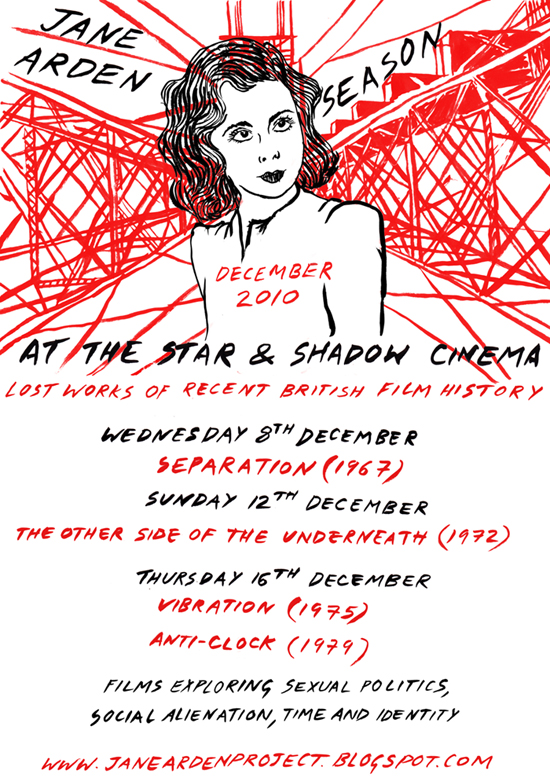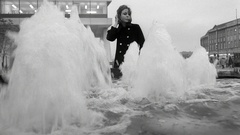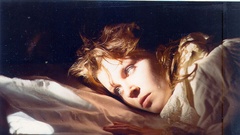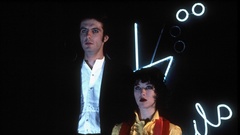Jane Arden Season

to
Jane Arden (1927- 1982) was a film director, actor, screenwriter, playwright, songwriter and poet.
In the late 1940s, after studying at RADA, her career started to form as she began to play parts on television and in London theatres. As the 1950s progressed, Arden concentrated on writing for stage and television, working with some of the key figures of British theatre and cinema such as Sheila Allen, Joan Simms, Jack Bond, David de Keyser, Alan Bates, Victor Spinetti, Albert Finney, Charles Laughton, Harold Pinter, and Philip Saville (whom she married). In the 1960s her work became increasingly radical as her interest and involvement in feminism and the anti-psychiatry movement grew.
This is particularly evident from 1965 onwards, when Jane began tracing female oppression and wrote a script for the BBC drama 'The Logic Game'. It was described as a "surrealist puzzle" which attempted to locate the isolation of women in the context of a bourgeois marriage.
Arden’s cinematic career begins with her original script and her performance in Separation (1967), which was directed by Arden’s collaborator Jack Bond.
In 1969 she produced the play Vagina Rex and the Gas Oven, which ran to a packed house for six weeks at Arts Lab in London. From this she formed the radical feminist theatre group Holocaust and then wrote the play A New Communion for Freaks Prophets and Witches, which was to become the film The Other Side of the Underneath. The film premiered at the London Film Festival in 1972.
In the early 1970s Jane spent time in Morocco. Upon her return she made two more films, both co-directed with Jack Bond, the experimental Vibration in 1974, and Anti-Clock, which opened the 1979 London Film Festival.
Both films incorporated experimental video techniques, Arden's vision was seminal in creating the 'multi-channel' film art form. Arden died in 1982 and, after an initial tribute at the National Film Theatre in 1983, the films were suppressed; her name consequently fading from the public realm.
After nearly three decades, in 2009, the BFI re-released Separation (1967), The Other Side of the Underneath (1972) and Anti-Clock (1979), creating a previously unavailable platform for a new generation to see her work.
However the depth and social relevance of this work commands that Arden’s output receive greater recognition and award her deserved status amongst her contemporaries.
Films in the Jane Arden Season:

08
Film: Jane Arden Season: Separation (1967)
8 Dec 2010, 7:30 p.m.
Scripted by and starring Jane Arden, Separation portrays the fragile complexity of its protagonist during a marital breakdown, through fragmented scenes, experimental, fragmented sequences. Set against the backdrop of 'swinging' 60s London. The soundtrack is by Procul Harum and light shows by artist Mark Boyle.

12
Film: Jane Arden Season: The Other Side Of The Underneath (1972)
12 Dec 2010, 7:30 p.m.
Jane Arden's violent and powerful film is an exploration into the mind of a woman labelled schizophrenic, whilst challenging the taboos of society. It is the only British feature film of the 1970s with a solo female direction credit and features a powerful soundtrack led by cellist Sally Pullinger.

16
Film: Jane Arden Season: Vibration & Anti-Clock (1975 & 1979)
16 Dec 2010, 7:30 p.m.
Vibration is "an exercise in meditation utilising experimental film and video techniques" Geoff Brown & Robert Murphy “A complex and fascinating experimental exploration of time and identity. Anti-Clock is a film of authentic, startling originality. Filled with high tension and high intelligence, Anti-Clock is mysterious, disturbing, fascinating and exciting.” (Jack Kroll, Newsweek)




